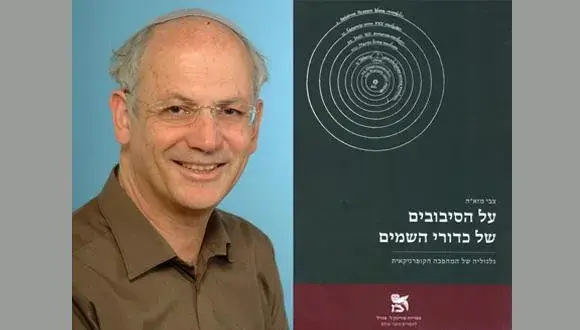The book published by Magnes, describes the scientific revolution that led to the understanding that the dome of the sky is only an optical illusion

Since the dawn of history, humans have imagined the firmament of the sky in which the stars are embedded as a round dome that rotates around the earth standing in the center, and the sun and the planets move around it. Prof. Zvi Maza's new book, "On the rotations of the celestial spheres", describes the scientific revolution at the end of which astronomers, and following them all of humanity, realized that the movements of the dome of the sky and the sun are imaginary movements, resulting from the rotation of the earth on its axis and its movement around the sun. The dome of the sky does not exist in reality and is the result of an optical illusion. The earth is the one that orbits the sun.
Went out looking for planets before everyone else
The echoes of the revolution created by the Polish astronomer Nicolaus Copernicus led to the creation of a new, modern physics, which had a profound effect on the natural sciences as a whole and on man's perception of his place in the universe. Prof. Maza's book describes three interwoven plot threads: the appearance and acceptance of the theory according to which the sun stands in the center and around it the planets' holidays; the development of the telescope by Galileo, who had an important contribution to the acceptance of Copernicus' model; and the scientific-religious conflict that accompanied the revolution from its beginning.
Prof. Zvi Maza is a retired faculty member at the School of Physics and Astronomy in the Raymond and Berly Sackler Faculty of Exact Sciences. He was the trustee of the Oren Family Chair in Experimental Physics, a recipient of the Weizmann Prize for Science and a recipient of the Laker Prize for the Study of Extrasolar Planets on behalf of the Harvard Center for Astrophysics and the Smithsonian Institution. As part of his research, he initiated a search for planets even at a time when everyone believed that it was impossible to discover planets outside the solar system. Since then he has participated in the discoveries of many dozens of planets, mainly with the help of spacecraft that move above the atmosphere to measure the intensity of starlight accurately.
This is Prof. Maza's third book and it was published by Magnes. His first book, "Introduction to Special Relativity", is a canonical teaching book for undergraduate physics studies. His second book, Darisht Shalom, which he edited together with Pinchas Lazer, offers a new reading of the Torah verses in the spirit of peace and justice.
"Every era has its scientific revolutions. It is amazing to see that even at the beginning of the modern era, Copernicus managed without any auxiliary device to bring about the most profound scientific revolution, perhaps the most profound, in human history. In my eyes, this is the great power of the human spirit, which can break into the realms of the unknown, and in our case into the vastness of the universe. The book provides a glimpse of the revolution that changed our view of ourselves, and may remind us that we are not at the center of the universe, but a small point in an infinite world," says Prof. Maza.
More of the topic in Hayadan:
- Phantom vision: a brain mechanism that allows the blind to see in their mind's eye
- For the first time, two new planets orbiting a double sun have been discovered
- Two planets each orbit two suns
- The science of planets outside the solar system is flourishing thanks to the genius of Michel Mayor, and the device he built
- An interaction between a black hole and a star has revealed a new type of black hole
